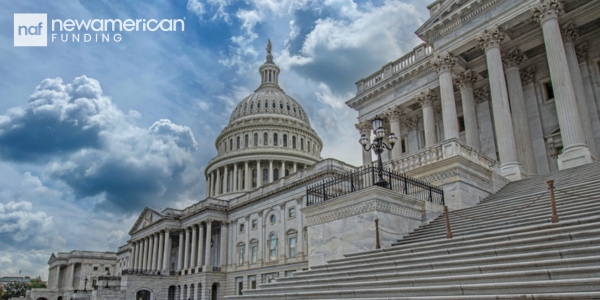Housing News, Videos
Refinance Rates Potentially Moving Higher
August 27, 2020
Alexis: Hey, everybody. As you all know, this is the Mortgage Rundown. My name is Alexis Quinney, and I'm here with Jason Obradovich, CIO of New American Funding. How have you been?
Jason: Good, Alexis. How are you?
Alexis: Pretty good. So, to start off, as always, I just am interested in hearing what is going on with the rates since we last spoke?
Jason: Yeah. You know, just looking back, you know, rates had really done nothing but go down every single month from December. You know you had some volatility in March, but after the Fed came in and started buying rates down through the purchase of MBS and Treasuries, rates just kept falling. And now we've leveled off. It's not that they have gone back up, but they are starting to tick up just ever so slightly.
Apply now for your refinance before rates go up.
Alexis: So, I've heard is that the FHFA has announced a 50-basis point charge on all of refis. So, can you expand a little bit on that? What does it really mean?
Jason: Yeah, absolutely. So, this is something that just came out a few weeks ago. The HFHA came out and said, well, first of all, the HFHA, they are the housing regulators for Fannie and Freddie. Right. They're under conservatorship. This is their regulator. And they make sure they do things properly that's in the public's best interest. And so, one of the things they came out with and said was, look, their credit costs have gone up due to delinquencies, forbearance, all the things that have happened during COVID and they want to recover some of those costs. And they're going to do so by adding some fee to refinances. It's not going to affect the purchase market that really is part of the economy. This is really on those borrowers that are trying to lower their payment. Yeah, it does sting at a bad time to have this type of fee, but it has happened before. They did do this, you know, right after the financial meltdown. And so how it's going to work is they're going to charge 50 basis points on all refinances. You know, it was originally slated for September 1. And the industry came out and said, "can't do that. We can't absorb it this quickly. It's going to affect, you know, too many companies, too many lives." And so they pushed it to December 1. And one of the exclusions they had on there. There are a couple of exclusions. One of the exclusions is any loan amounts under $125,000. So, in summary, it will be effective December 1. That doesn't necessarily mean you can go lock in your interest rate and not be hit with the fee on November 30. You really probably need to lock in your interest rate somewhere between September 15 and October 1. If you don't lock by then, you're probably going to get charged that fee.
Alexis: So, do you think that fee will ever go away, or is it here to stay?
Jason: The whole idea behind the fee was for Fannie and Freddie to recoup some of their credit losses because, you know, during COVID and this pandemic and all the forbearance and delinquencies, you know, they do have higher credit costs due to delinquencies and losses. And so, this is a way for them to recoup some of that fee or maybe potentially all of it. When they decide to reverse that fee, you know, it could be in six months, it could be in a year. You just don't really know. If you are thinking about refinances, you really do need to think about the fact that somewhere around September 15 to October 1, you're going to get hit with that when you go to lock your rate.
Apply today for a rate lock before mortgage rates move up.
Alexis: Is there any update if you think rates are going to stay this low much longer?
Jason: There's been a lot of talk about, you know, what the rate guidance is going to be going on for the next few years. I think the general belief is the Fed's going to keep interest rates low through 2022 and maybe even longer. Now, what the shape of the yield curve is and what that does to mortgage rates. You don't really necessarily know. But I wouldn't expect rates to go up anytime soon, especially while we're in the middle of the pandemic. I mean, quite honestly, the balance of this year and probably at least halfway through next year, I just can't imagine interest rates going up. And if they do, not by very much.
Alexis: Well, those are the only questions I have for you today. Again, this is great information, but that's it.
Jason: Awesome. Thank you.
Alexis: Yeah, thanks a lot. And we'll talk again in a couple of weeks!






 Smart Moves Start Here.
Smart Moves Start Here.